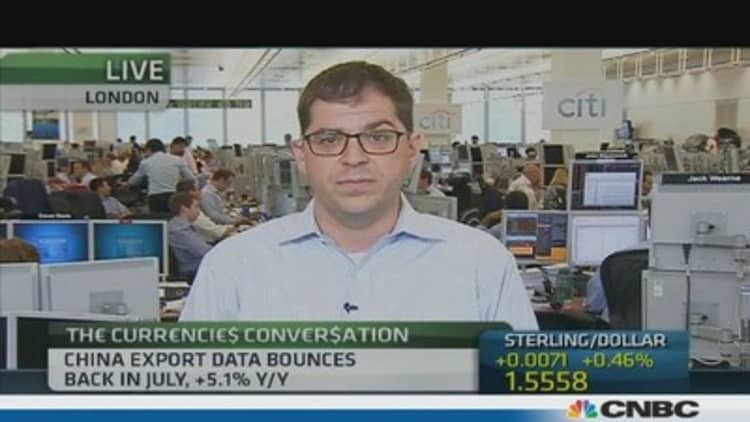The battered Australian dollar is a popular short for currency traders at the moment, but one economist says the market has got it wrong and the Aussie is, in fact, a 'screaming buy.'
After plummeting over 12 percent this year and falling to fresh three-year lows of $0.88 on Monday, the currency has managed a rebound since, rising around 2.3 percent on stronger than expected data from China.
(Read more: It seems the only way is down for the Aussie)
Clifford Bennett, chief economist at financial services firm White Crane Group in Sydney, says the currency has now hit bottom.
"The Australian dollar continues to fulfill our expectations of a fresh bull market… (it) is absolutely a screaming buy," said Bennett, who sees currency gaining another 13 percent by the year-end.

According to Bennett, many of the reasons to sell the currency are overplayed or "not happening" at all. Fears of a recession, for one, are unfounded and the economic slowdown is unlikely to last, he said.
This is because the country's mining boom, which helped drive Australia's rapid growth over the past decade, is not over, Bennett noted, and the upcoming Federal elections will provide the economy with a much needed catalyst for change.
(Read more: How low must the Aussie go before the RBA backs off?)
"The Australian people finally get a chance to have a say in who is their Prime Minister. And with the pent up potential for investment, due to caution over the politics of the nation, the last quarter and into next year is likely to see a very robust economy indeed," said Bennett.
Bennett expects the Australian economy to grow 4.5 percent next year, after growing at a 1.8 percent growth rate this year.
(Read more: Why the Australian dollar trade is a 'simple short')
Another misconception is the impact the slowing China growth will have on Australia.
"China's manufacturing sector is not collapsing," said Bennett, and recent positive data seem to support his view. Chinese exports rose by 5.1 percent in July, while imports jumped 10.9 percent on Thursday, both figures coming in much better than expectations.
Part of Australian dollar's weakness has been attributed the strength in the U.S. dollar, which have been bolstered by upbeat economic data and the prospect of Federal Reserve winding down its monetary stimulus. But Bennett argues that the greenback will not stay strong for long.
(Read more: Australia's stock market is on 'fire')
"Market sentiment is that good data and tapering are positive for the greenback. The real fundamentals though are huge trade deficit, negligible yield, and rapidly increasing foreign investment overseas by U.S. organizations," he said.
Finally, the dovish rhetoric from the country's central bank has been a big factor behind the recent Aussie selloff; the currency fell 4 percent last week after Reserve Bank of Australia's governor Glenn Steven signaled room for more rate cuts.
(Read more: Can Rudd Stop the Rout in the Aussie Dollar?)
The RBA cut rates to a record low of 2.5 percent last week and most analysts are forecasting another cut before the end of the year.
But Bennett said the move was already priced into the market, suggesting it should not provide a shock further down the line.
—By CNBC's Katie Holliday: Follow her on Twitter @hollidaykatie


